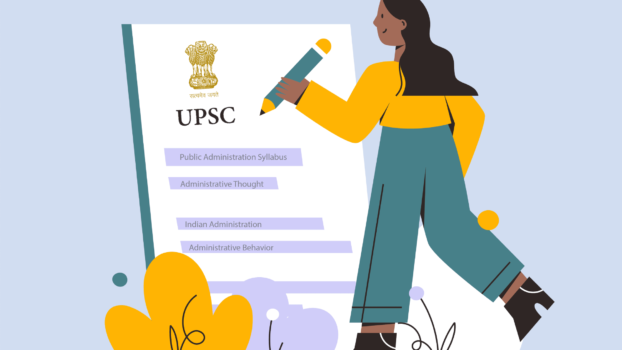The Civil Services Examination conducted by the Union Public Service Commission (UPSC) is one of the most challenging and prestigious exams in India. The Public Administration paper is a crucial part of this exam, demanding a deep understanding of both theoretical and practical aspects of governance.
This article provides a comprehensive overview of the UPSC syllabus for Public Administration, breaking it down into manageable sections. We’ll explore each topic in detail, offering insights and tips for effective preparation.
Introduction
- What is Public Administration?
- Public Administration is the study of how governments work. It encompasses the principles, theories, organizations, processes, and behaviors associated with the implementation of public policy.
- It delves into various aspects of governance, including:
- Planning and policy formulation
- Organizational structure and behavior
- Human resource management
- Financial administration
- Development administration
- Good governance and e-governance
- Why is Public Administration Important for UPSC?
- Public Administration plays a crucial role in the functioning of any government.
- As a future civil servant, you’ll be responsible for implementing government policies and managing public resources effectively.
- The UPSC syllabus for Public Administration is designed to assess your understanding of these critical aspects and your ability to apply them in real-world scenarios.
UPSC Syllabus for Public Administration: Paper I
Paper I focuses on the foundational aspects of Public Administration. Here’s a breakdown of the key topics:
- Introduction to Public Administration:
- Meaning, scope, and significance of Public Administration
- Evolution of Public Administration: Classical, Neo-classical, and Modern approaches
- New Public Management, Good Governance, and e-Governance
- Comparative Public Administration
- Administrative Thought:
- Contributions of major thinkers like Max Weber, F.W. Taylor, Elton Mayo, Chester Barnard, and Herbert Simon
- Behavioralism, Public Choice Theory, and New Public Service
- Principles of Organization:
- Principles of organization and their application in government
- Hierarchy, Span of Control, Delegation, and Decentralization
- Organizational structures: Line organization, Staff organization, Functional organization, and Matrix organization
- Human Resource Management:
- Recruitment, selection, training, and development of public servants
- Performance appraisal, motivation, and leadership in public organizations
- Financial Administration:
- Budgetary process, financial control, and public expenditure
- Public debt, taxation, and financial reforms
- Administrative Law:
- Concepts of administrative law, judicial review, and administrative tribunals
- Administrative Behavior:
- Decision-making, communication, and interpersonal relations in organizations
- Public Accountability and Control:
- Legislative control, judicial control, and citizen participation in governance
UPSC Syllabus for Public Administration: Paper II
Paper II focuses on the application of Public Administration in the Indian context. Here’s a breakdown of the key topics:
- Indian Administration:
- Evolution of Indian Administration: Pre- and post-Independence era
- Constitutional provisions related to administration
- Union-State relations and intergovernmental coordination
- Role of All India Services
- Development Administration:
- Concepts of development and development administration
- Approaches to development administration: Top-down vs. bottom-up
- Rural development, urban development, and regional development
- Social Administration:
- Social problems and social welfare programs in India
- Education, health, and social security
- Role of NGOs and civil society in social development
- Administrative Reforms in India:
- Reports of major administrative reforms committees
- e-Governance initiatives in India
- Challenges and prospects of administrative reforms
- Current Issues in Indian Administration:
- Corruption, red tape, and inefficiency
- Good governance and citizen-centric administration
- Role of technology in improving governance
UPSC Public Administration Optional Syllabus PDF
Here’s the latest updated Public Administration Optional Syllabus PDF
How to Prepare for the UPSC Syllabus for Public Administration
- Understand the Syllabus:
- Carefully go through the official UPSC syllabus for Public Administration.
- Identify the key areas and sub-topics.
- Break down the syllabus into manageable chunks.
- Build a Strong Foundation:
- Start with the basic concepts and theories of Public Administration.
- Refer to standard textbooks and academic journals.
- Develop a clear understanding of the evolution of Public Administration.
- Focus on Indian Context:
- Pay special attention to the Indian Administration section of the syllabus.
- Study the Indian Constitution, administrative reforms, and current issues in governance.
- Develop Analytical Skills:
- Analyze case studies, reports, and current affairs related to Public Administration.
- Practice answer writing to improve your analytical and presentation skills.
- Stay Updated:
- Keep yourself updated on current developments in the field of Public Administration.
- Read newspapers, magazines, and government reports regularly.
- Utilize Resources:
- Refer to standard textbooks, coaching materials, and online resources.
- Join online forums and discussion groups to interact with other aspirants.
Recommended Books for UPSC Syllabus for Public Administration
- Introduction to Public Administration:
- Administrative Theory by Awasthi and Maheshwari
- Indian Administration by M. Laxmikanth
- New Horizons of Public Administration by Mohit Bhattacharya
- Administrative Thought:
- Classics of Organization Theory by Jay Shafritz and Philip Ott
- Administrative Behavior by Herbert Simon
- Indian Administration:
- Indian Administration by M. Laxmikanth
- Governance in India by Ramesh K. Arora
- Development Administration:
- Development Administration by R.B. Jain
- Social Administration:
- Social Problems in India by Ram Ahuja
Tips for Writing Effective Answers
- Understand the Question:
- Carefully read and analyze the question before you start writing.
- Identify the key keywords and understand what the examiner is looking for.
- Structure Your Answer:
- Use a clear and concise structure for your answer.
- Start with an introduction, followed by the main points, and conclude with a summary.
- Use Diagrams and Flowcharts:
- Use diagrams and flowcharts to illustrate complex concepts and theories.
- Support Your Arguments:
- Support your arguments with relevant examples, data, and case studies.
- Write in a Clear and Concise Manner:
- Use simple and precise language.
- Avoid jargon and technical terms.
- Practice Regularly:
- Practice writing answers to previous year question papers.
- Get your answers evaluated by experienced mentors.
Importance of Current Affairs
- Stay Updated:
- Keep yourself updated on current affairs related to Public Administration.
- Read newspapers, magazines, and government reports regularly.
- Integrate with Syllabus:
- Relate current affairs to the topics covered in the UPSC syllabus for Public Administration.
- Analyze how current events impact government policies and administrative practices.
- Use in Answer Writing:
- Use relevant current affairs to illustrate your points and support your arguments in answer writing.
Pros & Cons of UPSC Public Administration Optional
Ultimately, the decision of whether or not to choose Public Administration as an optional depends on your individual preferences, strengths, and learning style. If you are interested in governance, have a good grasp of current affairs, and are comfortable with theoretical subjects, Public Administration can be a good choice. However, if you prefer more concrete subjects or are intimidated by high competition, you might want to consider other options.
FAQs: UPSC Syllabus For Public Administration
1. What is the scope of the UPSC Public Administration syllabus?
- The syllabus covers a wide range of topics, including administrative thought, organizational behavior, Indian administration, development administration, and current issues in governance.
2. How many papers are there in the UPSC Public Administration optional?
- There are two papers: Paper I focuses on administrative theory, while Paper II focuses on Indian administration and current issues.
3. Does the Public Administration syllabus overlap with other UPSC papers?
- Yes, it significantly overlaps with General Studies Paper II, which covers governance, polity, and social issues.
4. What are the key areas to focus on in Paper I?
- Important areas include administrative thought (classical, neo-classical, and modern approaches), principles of organization, human resource management, and financial administration.
5. What are the key areas to focus on in Paper II?
- Key areas include Indian administration, development administration, social administration, and current issues in Indian administration.
6. How can I prepare for the dynamic nature of Paper II?
- Stay updated on current affairs related to governance, administration, and social issues through newspapers, magazines, and government reports.
7. What are some good resources for preparing for the UPSC Public Administration optional?
- Standard textbooks, coaching materials, online resources, and previous year question papers are valuable resources.
8. Is Public Administration a good optional for beginners?
- It can be a good choice for those interested in governance and with a good grasp of current affairs. However, it requires consistent effort and a deep understanding of theoretical concepts.
9. How can I improve my answer writing skills for Public Administration?
- Practice writing answers to previous year question papers, analyze model answers, and get feedback from mentors.
10. What is the importance of current affairs in Public Administration preparation?
- Current affairs are crucial for Paper II and can be integrated into your answers to demonstrate your understanding of contemporary issues in governance.
Conclusion
The UPSC syllabus for Public Administration is demanding but rewarding. With consistent effort, dedication, and the right approach, you can successfully prepare for this challenging exam.
Remember to focus on building a strong foundation, developing analytical skills, and staying updated on current affairs.
By following the tips and strategies outlined in this article, you can increase your chances of success in the UPSC Civil Services Examination.
Disclaimer: This article provides a general overview of the UPSC syllabus for Public Administration. The official UPSC syllabus should be referred to for the most accurate and up-to-date information.
Discover more from ExamQuestIndia: The Best Exam Prep Platform in India
Subscribe to get the latest posts sent to your email.








